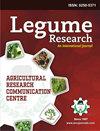Light Enrichment, Flowering Asynchrony and Reproduction Success in Two Field-Grown Soybeans in Northern China
IF 0.8
4区 生物学
Q3 AGRONOMY
引用次数: 1
Abstract
The flowering process at single plant level in soybean is a continuous dynamic system. Whether a flower can survive to mature depends on where it is located and when it is initiated. A field experiment was conducted to analyse the effect of flowering asynchrony on single flower survival and response of flowers or pods distribution to light enrichment. Our data suggest that early flowers (number 1-5) definitely survive and develop into mature pod because they don’t encounter fierce assimilates competition from other flowers or pods. Later flowers are usually prone to abortion, especially when five or more flowers at the same node in two soybean cultivars (Glycine max L. Merr. namely, Heinong35 and Kennong18). The flowers on sub-raceme frequently fail to develop into pods. Compared with the flowers on main-raceme, that on sub-raceme maybe have weak competitive ability to assimilation. Most flowers on bottom branches successfully develop into pods due to the strong supply of assimilation from the leaves of branches. Light enrichment significantly increase the number of flowers or pods across the main axis. However, the rate of flower abortion is still relatively high by observing the distribution curves of flowers or pods under light enrichment. Soybean plant has the characteristic of excessive flower production and flower abscission is more likely to be expression of biological adaptability.中国北方两种大田大豆的光富集、开花不同步及繁殖成功
大豆单株水平的开花过程是一个连续的动态系统。一朵花能否存活到成熟取决于它的生长位置和起始时间。通过田间试验,分析了开花不同步对单花存活的影响以及花或荚分布对光富集的响应。我们的数据表明,早期花(1-5)肯定能存活并发育成成熟的荚果,因为它们没有遇到来自其他花或荚果的激烈的同化物竞争。在两个大豆品种(Glycine max L. Merr.)中,当5朵或更多的花在同一节时,后期花通常容易流产。即河农35号和垦农18号)。亚总状花序上的花经常不能发育成豆荚。与主总状花序上的花相比,亚总状花序上的花可能具有较弱的同化竞争能力。底部树枝上的花大多能成功地发育成豆荚,这是由于树枝上的叶子提供了强大的同化作用。光富集显著增加了主轴上的花或荚的数量。但通过观察光富集条件下花或荚果的分布曲线,花的败育率仍然较高。大豆植物具有多花的特点,花脱落更可能是生物适应性的表达。
本文章由计算机程序翻译,如有差异,请以英文原文为准。
求助全文
约1分钟内获得全文
求助全文
来源期刊

Legume Research
AGRONOMY-
CiteScore
1.30
自引率
37.50%
发文量
256
审稿时长
6-12 weeks
期刊介绍:
Legume Research An International Journal. The Journal is an official publication of Agricultural Research Communication Centre. It is designed to bring out the original research articles on genetics, breeding, physiology, bacterial avtivity, production, quality, biochemistry and seeds of legumes crops. The objective of the journal is to serve as a forum for scientific community to publish their research findings on legumes ans to provide basis for new research. Journal is being scanned in the important indexing and abstracting services.
 求助内容:
求助内容: 应助结果提醒方式:
应助结果提醒方式:


